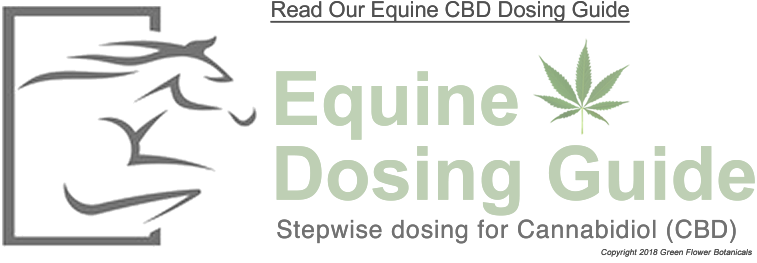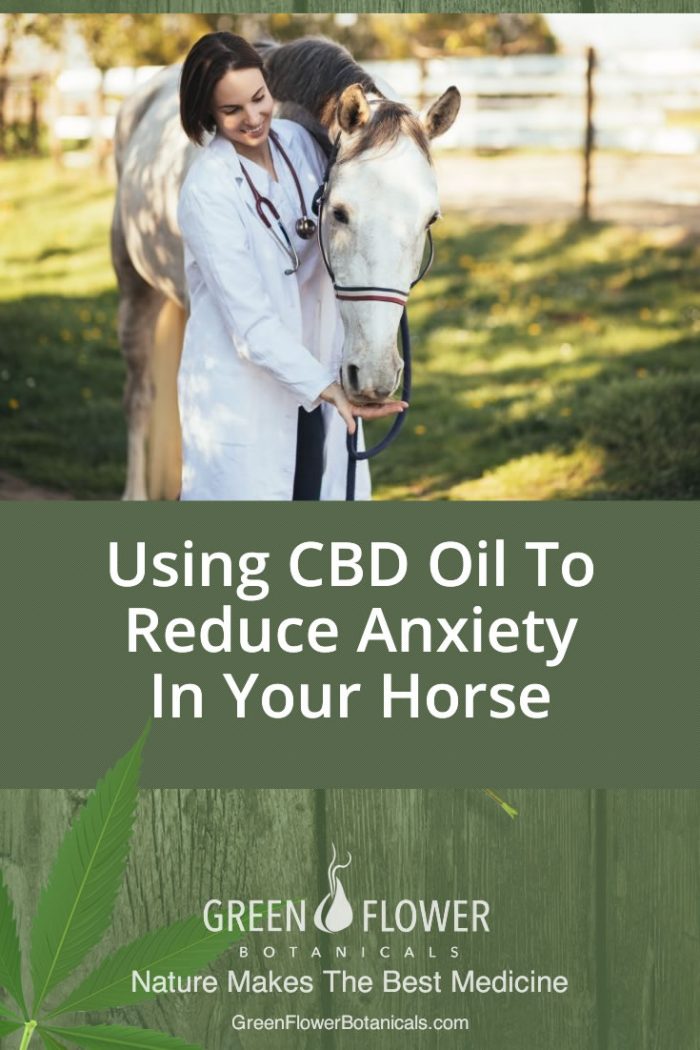 How CBD can Reduce Anxiety in your Horse
How CBD can Reduce Anxiety in your Horse
Among the ten million horses that currently live in the U.S., a good share of them suffer from some form anxiety, according to data from the American Horse Council – the two most common being separation and performance/arena anxiety.
Anxiety in horses could be caused by daily situations, and each stems from a different source. It is critical to understand both the instinctual behavior as well as the health requirements of your horse if you have any chance of combating this serious mental condition. Equestrians are doing everything to ease anxiety in their horses, from desensitizing the animals from the objects of their fears to the use of full spectrum CBD oil for horses. In this article, you will learn all it takes to ease your horse from anxiety and panic attacks.
Have you ever wondered what goes on in a horse’s mind?
Finding the underlying cause of your horse’s anxiety will take some patience and detective work, so go ahead and put your Sherlock Holmes hat on.
To comprehend any form of horse anxiety, you first need to put yourself in the animal’s position. What distresses other pets such as cats and dogs is not the same as what upsets horses. Unlike cats and dogs, which evolved from predatory ancestors, horses are herbivores and herd animals – in short, dinner for predators.
As they evolved, those that ran faster survived and passed these essential attributes to their offspring. The result is a robust, smart and highly sensitive creature always on the lookout for lurking threats.
No wonder…
Naturally, horses are hardwired to flight than to fight in scary situations. Furthermore, being herd animals, horses often seek company in order to feel safe. As in all horse herds, you will find a definite pecking order. Normally an alpha mare that leads the herd, other mares forming ranks behind her, and a strong stallion that guards the group. In a herd, safety is in numbers, minimizing the chances of any individual being picked up by a predator.
Different forms of anxiety in horses
As it turns out…
In horses, symptoms arising from maladaptive fear and anxiety can occur due to a number of reasons such as:
- Separation anxiety
- Performance/arena anxiety
- Situational anxiety
- Training anxiety
- Boredom
Separation anxiety
Being herd animals, horses and ponies form strong social bonds with their “herd mates”. Therefore, being separated from them even for a short while may result in feelings of distress and anxiety. Horses dislike being cut off from the herd even for grooming and saddling purposes and they may try to bolt and run back to the herd’s safety.
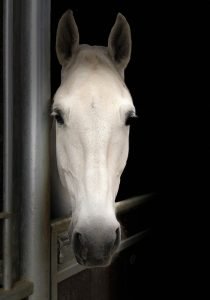
In the same breath, horses can also get anxious when separated from a rider they were used to, or when riders change too often. Changing the living conditions of a horse abruptly such as taking it from huge pasture land into a stable may trigger anxiety as well.
Performance/Arena anxiety
Like people, horses can get anxious before strange situations such as big events. First, horses are really good at reading our non-verbal cues – like sensing tension in the rider. Therefore, when the handler is anxious, the horse will also be on alert, waiting for things to go wrong at any moment. Most horses get transient anxiety during their first shows, while some remain nervous each time they get into an arena.
Nervousness in horses can also be caused by specific triggers such as, smells, sounds and sights in the competition. For instance, some horses get extremely terrified when being ridden in an indoor arena while it’s raining. This could be because of the noise or they could be instinctively trying to avoid the storm as it would in the wild.
Other horses get terrified when the rider is holding a whip, a lot of people claim this is as a result of past abuse, however, we have seen this behavior even in well-trained horses that have never been beaten.
Lastly…
Thoroughbreds that are used to high performance in race tracks may transfer their anxiety even after they have moved on to a different life where the stakes are not as high.
Training anxiety
Horses in training may get upset when they are asked to do a certain movement for the first time. they may end up confused, frustrated and desperately start trying to figure out what you mean, how cute, huh? Even the smartest horses will experience one of these moments when being taught new tricks.
Situational anxiety
Situational anxiety is when a horse associates a specific scenario with something horrible happening. For example, even years after a trailer accident, a horse may experience anxiety each time they get into a trailer due to the fear and pain associated with the past event. Diagnosing such anxiety is difficult, especially if your horse is new and you don’t know much about their history.
Boredom
You may never have looked at it that way, but think about it… If your horse is walking and weaving in the stable too much, they may be bored, making them anxious. Could it be they just don’t have enough to do?
Symptoms of Horse Anxiety
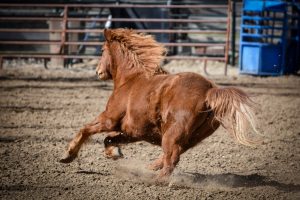
- Stall walking and weaving
Weaving is when your horse sways, or walks from side to side for hours as if in a haze. Stall walking, in contrast, is when your horse is walking in circles around the stable instead of side-to-side. Both stall walking and weaving are considered a sign of boredom, stress and anxiety in horses according to the Merck Veterinary Manual. Walking and weaving may cause strain on the ligaments and joints. Additionally, they may cause a horse to be underweight because they end up using excess calories.
- Shaking/trembling
Anxious horses tremble while being led, ridden or even while just standing. In most cases, you can see the twitch visibly as the skin ripples.
- Eye rolling
If your horse rolls his eyes frequently showing his whites, then he is anxious. In most cases, they roll their eyes while trembling or in a tense posture.
- Retreating to a corner
Like mentioned above, horses will try to run first and ask later. When afraid and confined to a space such as a stall, they will back themselves into the safest position – mostly a corner.
- Frequent rearing
When horses are afraid, they rear in order to defend themselves with their front legs. If they do it often, it may be a sign of anxiety.
- Bolting
Anxious horses easily get spooked by things that might seem insignificant, such as a shiny piece of paper or sudden noise. When spooked, a horse will normally bolt, or run off. This can happen anywhere, anytime and may cause accidents. If it happens too often or in specific circumstances, your horse may be experiencing some form of anxiety.
Negative impacts of anxiety in horses
Anxiety can cause many negative effects in horses, ultimately death. To start off, anxious horses are normally underweight and in poor health condition. Most will spot a lackluster coat and bad hoof health. This is mainly because they are burning up more calories than they can process.
Furthermore, anxious horses can injure their joints, ligaments, hooves and muscles from constant weaving and walking. Horses that bolt after getting spooked are also prone to head injuries, something rare but very dangerous when it comes to horses. Preventing such a situation is of your best interest.
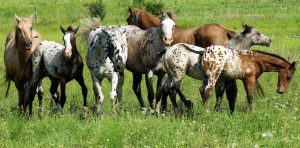
As if that’s not enough…
Anxious horses have been found to be more susceptible to colic or enteroliths. These are stone-like undigested fiber and fecal impactions that can lead to chronic impaction colic.
Finally, anxious horses find a hard time enjoying life. A horse who has to wear grooves because of constant weaving and walking in the stall or one that cannot be ridden away from the herd is often seen as a problem horse, best to be left for expert owners. Such problems can be solved through patience and training, but with many other better options available, it becomes difficult to find an anxious horse a happy home.
How to help a horse with anxiety – including treatment with full spectrum CBD oil for horses
No matter what is causing anxiety in your horse, all equestrians have to agree that all horses get scared of something – every once in a while. It is in its nature as a prey to stay on the lookout. However, when the fear gets chronic and starts affecting the quality of life of your animal and yourself, it is time to take measures.
Get to the root of the problem
The first step, which is usually harder than it sounds, is determining the cause of anxiety in your horse. Horses are smart and have excellent memory, making it easy to train them. However, their ability to deduce from past experiences also make it difficult to convince them that a past bad situation will not be as bad in the future.
Treating anxiety in horses using full-spectrum CBD oil
If you have not heard, CBD oil for pets is the hot topic in town right now, and there is good reason why. This compound, derived from the hemp or cannabis plants has proven to harbor a wide range of therapeutic effects such as, reducing chronic pain associated with cancer and other conditions, managing mood and mental disorders, nausea, inflammation among others.
For instance, CBD has the ability to reduce various forms of anxiety in animal and human studies without any side effects. This has caught the interest of both vets and equestrians who have been searching for a natural, healthy alternative for treating anxiety in horses.
CBD interacts with your horse’s immune system naturally
In the 80s, Israeli scientists discovered a new biological systems that exists in all mammals called the endocannabinoid system. It was named after the plant that led to its discovery – the cannabis plant. This system is composed of receptors (CB1 and CB2) as well as natural hormones (called endocannabinoids) that activate the receptors such as anandamide and 2-AG. This system can also be activated by phyto-cannbinoids (cannabinoids from plants) such as CBD and THC.
Unlike THC which activated CB1 receptors in the brain to produce a high, CBD is non-psychoactive and it interacts with both CB1 and CB2 receptors to offer a wide range of therapeutic effects that are all aimed at maintaining homeostasis and maintaining balance at the cellular level. This system is involved in regulating mental processes, including mood, appetite and sleep.
This is where things get interesting…
CBD has been shown to reduce anxiety in mammals. For instance, a data analysis carried out in 2015 that reviewed past animal and human studies concluded that CBD oil stands as a hopeful treatment for various anxieties in the near future. Currently, there are companies offering CBD oil extracts that can be used to treat anxiety in pets and the owners have been reporting really good news.
However, research into CBD and how it affects mammals is still in its infancy and care should be taken to avoid any adverse effects. Nonetheless, CBD oil is not known to have any serious side effects and there have been no cases of overdosing.
Parting Shot
Ultimately, what horses need the most is to trust the handler. A horse that trusts its rider rarely gets anxious even under scary situations. Horses susceptible to anxiety need to be handled by someone composed and confident. They will benefit from the clear signals and strong leadership. To teach a horse to trust the rider, it has to start from scratch. Be clear and consistent and avoid sudden movements. Do not tense up, tiptoe around or get intimidated by the size, otherwise, your horse will notice and also get anxious, wondering what is about to go wrong.
To help you reduce horse anxiety, proper dosages of full spectrum CBD oil for horses can help your equine friend to face its anxiety more effectively.
Related Articles:
How CBD Oil For Horses Can Help Your Animal Lead A Healthier Life
9 Reasons To Add CBD Oil To Your Equine Health Kit



